- Home
- W. Somerset Maugham
On a Chinese Screen Page 13
On a Chinese Screen Read online
Page 13
Everyone in the club looked just the same as ever. He did not know why he should have expected them to look different. It was a comfort. These men, living for many years with one another lives that were methodically regulated, had acquired a number of little idiosyncrasies -- one of them hummed incessantly while he played bridge, another insisted on drinking beer through a straw -- and these tricks which had so often irritated the taipan now gave him a sense of security. He needed it, for he could not get out of his head that strange sight he had seen; he played bridge very badly; his partner was censorious, and the taipan lost his temper. He thought the men were looking at him oddly. He wondered what they saw in him that was unaccustomed.
Suddenly he felt he could not bear to stay in the club any longer. As he .went out he saw the doctor reading The Times in the reading-room, but he could not bring himself to speak to him. He wanted to see for himself whether that grave was really there and stepping into his chair he told his bearers to take him to the cemetery. You couldn't have an hallucination twice, could you? And besides, he would take the overseer in with him and if the grave was not there he wouldn't see it, and if it was he'd give the overseer the soundest thrashing he*d ever had. But the overseer was nowhere to be found. He had gone out and taken the keys with him. When the taipan found he could not get into the cemetery he felt suddenly exhausted. He got back into his chair and told his bearers to take him home. He would lie down for half an hour before dinner. He was tired out. That was it. He had heard that people had hallucinations when they were tired. When his boy came in to put out his clothes for dinner it was only by an effort of will that he got up. He had a strong inclination not to dress that evening, but he resisted it: he made it a rule to dress, he had dressed every evening for twenty years and it would never do to break his rule. But he ordered a bottle of champagne with his dinner and that made him feel more comfortable. Afterwards he told the boy to bring him the best brandy. When he had drunk a couple of glasses of this he felt himself again. Hallucinations be damned ! He went to the billiard room and practised a few difficult shots. There could not be much the matter with him when his eye was so sure. When he went to bed he sank immediately into a sound sleep.
But suddenly he awoke. He had dreamed of that open grave and the coolies digging leisurely. He was sure he had seen them. It was absurd to say it was an hallucination when he had seen them with his own eyes. Then he heard the rattle of the night watchman going his rounds. It broke upon the stillness of the night so harshly that it made him jump out of his skin. And then terror seized him. He felt a horror of the winding multitudinous streets of the Chinese city, and there was something ghastly and terrible in the convoluted roofs of the temples with their devils grimacing and tortured. He loathed the smells that assaulted his nostrils. And the people. Those myriads of blue clad coolies, and the beggars in their filthy rags, and the merchants and the magistrates, sleek, smiling, and inscrutable, in their long black gowns. They seemed to press upon him with menace. He hated the country. China. Why had he ever come? He was panic-stricken now. He must get out. He would not stay another year, another month. What did he care about Shanghai?
"Oh, my God," he cried, "if I were only safely back in England."
He wanted to go home. If he had to die he wanted to die in England. He could not bear to be buried among all these yellow men, with their slanting eyes and their grinning faces. He wanted to be buried at home, not in that grave he had seen that day. He could never rest there. Never. What did it matter what people thought? Let them think what they liked. The only thing that mattered was to get away while he had the chance.
He got out of bed and wrote to the head of the firm and said he had discovered he was dangerously ill. He must be replaced. He could not stay longer than was absolutely necessary. He must go home at once.
They found the letter in the morning clenched in the taipan's hand. He had slipped down between the desk and the chair. He was stone dead.
L
METEMPSYCHOSIS
HE was decently though far from richly, clad. He had a small round cap of black silk on his head, and on his feet black silk shoes. His robe was pale green of the flowered silk which is made in Chiating, and over it he wore a short black jacket. He was an old man, with a white beard, long and for a Chinese full; his broad face, much wrinkled, especially between the brows, was benign, and his large horn spectacles did not conceal the friendliness of his eyes. He had all the look of one of those sages whom you may see in an old picture seated by a bamboo grove at the foot of a great rocky mountain contemplating the Eternal Way. But now his face bore an expression of great annoyance and his kindly eyes were frowning, for he was engaged in the singular occupation (for a man of his appearance) of leading a little black pig along the causeway between the flooded padi fields. And the little black pig, with sudden jerks, with unexpected dodging, ran hither and thither, in every direction but that in which the old gentleman wished to go. He pulled the string violently, but the pig, squealing, refused to follow; he addressed it in terms of expostulation and of abuse, but the little pig sat on his haunches and looked at him with malicious eyes. Then I knew that in the Tang dynasty the old gentleman had been a philosopher who had juggled with facts, as philosophers will, making them suit the whims which he called his theories; and now, after who knows how many existences, he was expiating his sins in suffering in his turn the stubborn tyranny of the facts which he had outraged.
LI
THE FRAGMENT
WHEN you travel in China I think nothing amazes you more than the passion for decoration which possesses the Chinese. It is not astonishing that you should find decoration in memorial arches or in temples; here the occasion for it is obvious; and it is natural enough to find it in furniture; nor does it surprise, though it delights you, to discover it on the commoner objects of household use. The pewter pot is enriched with a graceful design; the coolie's rice bowl has its rough but not inelegant adornment. You may fancy that the Chinese craftsman does not look upon an article as complete till by line or colour he has broken the plainness of a surface. He will even print an arabesque on the paper he uses for wrapping. But it is more unexpected when you see the elaborate embellishment of a shop-front, the splendid carving, gilt or relieved with gold, of its counter, and the intricate sculpture of the signboard. It may be that this magnificence serves as an advertisement; but it does so only because the passer-by, the possible customer, takes pleasure in elegance; and you are apt to think that the tradesman who owns the shop takes pleasure in it too. When he sits at his door, smoking his water pipe and through his great horn spectacles reading a newspaper, his eyes must rest with good humour sometimes on the fantastic ornamentation. On the counter, in a long-necked pot, stands a solitary carnation.
You will find the same delight in the ornate in the poorest villages where the severity of a door is mitigated by a charming piece of carving, and where the trellis of the windows forms a complicated and graceful pattern. You can seldom cross a bridge, in however unfrequented a district, without seeing in it the hand of an artist. The stones are so laid as to make an intricate decoration, and it seems as though these singular people judged with a careful eye whether a flat bridge or an arched one would fit in best with the surrounding scene. The balustrade is ornamented with lions or with dragons. I remember a bridge that must have been placed just where it was for the pure delight of its beauty rather than for any useful purpose, since, though broad enough for a carriage and pair to pass over it, it served only to connect a narrow path that led from one ragged village to another. The nearest town was thirty miles away. The broad river, narrowing at this point, flowed between two green hills, and nut trees grew on the bank. The bridge had no balustrade. It was constructed of immense slabs of granite and rested on five piers; the middle pier consisted of a huge and fantastic dragon with a long and scaly tail. On the sides of the outer slabs, running the whole length of the bridge, was cut in very low relief a pattern of an unimaginable lightness,
delicacy and grace.
But though the Chinese take such careful pains to avoid fatiguing your eye, with sure taste making the elaborateness of a decoration endurable by contrasting it with a plain surface, in the end weariness overcomes you. Their exuberance bewilders. You cannot refuse your admiration to the ingenuity with which they so diversify the ideas that occupy them as to give you an impression of changing fantasy, but the fact is plain that the ideas are few. The Chinese artist is like a fiddler who with infinite skill should play infinite variations upon a single tune.
Now, I happened upon a French doctor who had been in practice for many years in the city in which I then found myself; and he was a collector of porcelain, bronze, and embroidery. He took me to see his things. They were beautiful, but they were a trifle monotonous. I admired perfunctorily. Suddenly I came upon the fragment of a bust.
"But that is Greek," I said, in surprise.
"Do you think so? I am glad to hear you say it."
Head and arms were gone, and the statue, for such it had been, was broken off just above the waist, but there was a breastplate, with a sun in the middle of it, and in relief Perseus killing the dragon. It was a fragment of no great importance, but it was Greek, and perhaps because I was surfeited with Chinese beauty it affected me strangely. It spoke in a tongue with which I was familiar. It rested my heart. I passed my hands over its age-worn surface with a delight I was myself surprised at. I was like a sailor who, wandering in a tropic sea, has known the lazy loveliness of coral islands and the splendours of the cities of the East, but finds himself once more in the dingy alleys of a Channel port. It is cold and grey and sordid, but it is England.
The doctor -- he was a little bald man, with gleaming eyes and an excitable manner -- rubbed his hands.
"Do you know it was found within thirty miles of here, on this side of the Tibetan frontier?"
"Found!" I exclaimed. "Found where?"
"Mon Dieu, in the ground. It had been buried for two thousand years. They found this and several fragments more, one or two complete statues, I believe, but they were broken up and only this remained."
It was incredible that Greek statues should have been discovered in so remote a spot.
"But what is your explanation?" I asked.
"I think this was a statue of Alexander," he said.
"By George!"
It was a thrill. Was it possible that one of the commanders of the Macedonian, after the expedition into India, had found his way into this mysterious corner of China under the shadow of the mountains of Tibet? The doctor wanted to show me Manchu dresses, but I could not give them my attention. What bold adventurer was he who had penetrated so far towards the East to found a kingdom? There he had built a temple to Aphrodite and a temple to Dionysus, and in the theatre actors had sung the Antigone and in his halls at night bards had recited the Odyssey. And he and his men listening may have felt themselves the peers of the old seaman and his followers. What magnificence did that stained fragment of marble call up and what fabulous adventures ! How long had the kingdom lasted and what tragedy marked its fall? Ah, just then I could not look at Tibetan banners or celadon cups; for I saw the Parthenon, severe and lovely, and beyond, serene, the blue iEgean.
LI
ONE OF THE BEST
I COULD never remember his name, but whenever he was spoken of in the port he was always described as one of the best. He was a man of fifty perhaps, thin and rather tall, dapper and well-dressed, with a small, neat head and sharp features. His blue eyes were goodnatured and jovial behind his pince-nez. He was of a cheerful disposition, and he had a vein of banter which was not ineffective. He could turn out the sort of jokes that make men standing at the club bar laugh heartily, and he could be agreeably malicious, but without ill-nature, about any member of the community, who did not happen to be present. His humour was of the same nature as that of the comedian in a musical play. When they spoke of him they often said:
"You know, I wonder he never went on the stage. He'd have made a hit. One of the best."
He was always ready to have a drink with you and no sooner was your glass empty than he was prompt with the China phrase:
"Ready for the other half?"
But he did not drink more than was good for him.
"Oh, he's got his head screwed on his shoulders the right way," they said. "One of the best."
When the hat was passed round for some charitable object he could always be counted on to give as much as anyone else, and he was always ready to go in for a golf competition or a billiards tournament. He was a bachelor.
"Marriage is no use to a man who lives in China," he said. "He has to send his wife away every summer and then when the kids are beginning to be interesting they have to go home. It costs a deuce of a lot of money and you get nothing out of it."
But he was always willing to do a good turn to any woman in the community. He was number one at Jardine's, and he often had the power to make himself useful. He had been in China for thirty years, and he prided himself on not speaking a word of Chinese. He never went into the Chinese city. His compradore was Chinese, and some of the clerks, his boys of course, and the chair coolies; but they were the only Chinese he had anything to do with, and quite enough too.
"I hate the country, I hate the people," he said. "As soon as I've saved enough money I mean to clear out."
He laughed.
"Do you know, last time I was home I found everyone cracked over Chinese junk, pictures and porcelain, and stuff. Don't talk to me about Chinese things, I said to 'em. I never want to see anything Chinese as long as I live."
He turned to me.
"I'll tell you what, I don't believe I've got a single Chinese thing in my house."
But if you wanted him to talk to you about London he was prepared to do so by the hour. He knew all the musical comedies that had been played for twenty years and at the distance of nine thousand miles he was able to keep up with the doings of Miss Lily Elsie and Miss Elsie Janis. He played the piano and he had a pleasing voice; it required little persuasion to induce him to sit down and sing you the popular ditties he had heard when last he was at home. It was quite singular to me, the unfathomable frivolity of this grey-haired man; it was even a little uncanny. But people applauded him loudly when he finished.
"He's priceless, isn't he?" they said. "Oh, one of the best."
LII
THE SEA-DOG
SHIPS' captains for the most part are very dull men. Their conversation is of freights and cargoes. They have seen little more in the ports they visit than their agent's office, the bar which their kind frequents, and the bawdy houses. They owe the glamour of romance which their connection with the sea has cast over them to the imagination of the landsman. To them the sea is a means of livelihood and they know it, as an engine-driver knows his engine, from a standpoint which is aridly practical. They are men, working men, of a narrow outlook, with small education for the most part and little culture; they are all of a piece, and they have neither subtlety nor imagination. Straightforward, courageous, honest, and reliable, they stand four-square on the immutability of the obvious; and they are definite: they are placed in their surroundings like the objects in a stereoscopic photograph so that you seem to see all round them. They offer themselves to you with salient traits.
But no one could have adhered less to type than Captain Boots. He was the master of a little Chinese steamer on the Upper Yangtze and because I was his only passenger we spent a good deal of time in one another's company. But though he was fluent of speech, garrulous even, I see him shadowly; and he remains in my mind indistinctly. I suppose it is on account of his elusiveness that he engages my imagination. There was certainly nothing elusive in his appearance. He was a big man, six foot two, powerfully built, with large features and a red, friendly face. When he laughed he showed a row of handsome gold teeth. He was very bald, and clean-shaven; but he had the most bushy, abundant, and aggressive eyebrows that I have ever seen, and under the
m mild blue eyes. He was a Dutchman and though he had left Holland when he was eight, he still spoke with an accent. He could not pronounce th, but always made it d. His father, a fisherman who sailed his own schooner on the Zuyder Zee, hearing that fishing was good in Newfoundland, had set out with his wife and his two sons across the broad Atlantic. After some years there and in Hudson's Bay -- all this was hard on half a century ago -- they had sailed round the Horn for the Behring Straits. They hunted seal until the law stepped in to save the beasts they were exterminating, and then Boots, a man now and a brave one, God knows, sailed here and there, as third, then as second mate, on sailing vessels. He had been almost all his life in sail and now on a steamer could not make himself at home.
"It's only in a sailing boat you get comfort," he said. "Dere's no comfort anywhere when you got steam."
He had been all along the coast of South America after nitrates, then to the west coast of Africa, then again, fishing cod off the coast of Maine, to America; and after that with cargoes of salt fish to Spain and Portugal. A tavern acquaintance in Manila suggested that he should try the Chinese Customs. He went to Hong-Kong, where he was taken on as a tide-waiter, and presently was put in command of a steam launch. He spent three years, chasing the opium smugglers, and then, having saved a little money, built himself a forty-five ton schooner with which he determined to go to the Behring Straits and try his luck again with the seal fishery.
"But I guess my crew got scared," he said. "When I got to Shanghai they deserted and I couldn't get no oder, so I had to sell de boat and I shipped on a Vessel what was going to Vancouver."

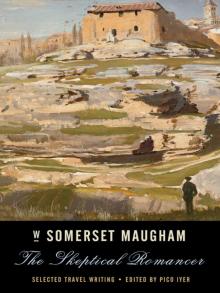 The Skeptical Romancer: Selected Travel Writing
The Skeptical Romancer: Selected Travel Writing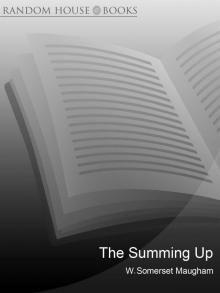 The Summing Up
The Summing Up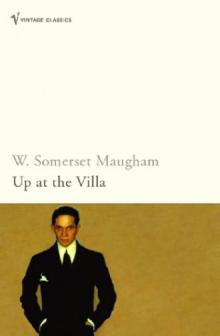 Up at the Villa
Up at the Villa The Razor's Edge
The Razor's Edge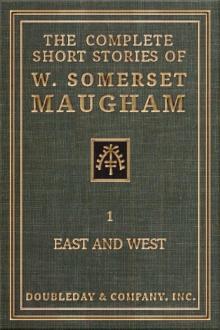 The Complete Short Stories of W. Somerset Maugham: East and West (Vol. 1 of 2))
The Complete Short Stories of W. Somerset Maugham: East and West (Vol. 1 of 2))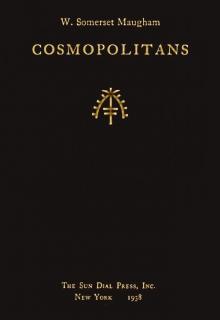 Cosmopolitans
Cosmopolitans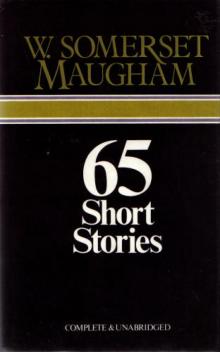 65 Short Stories
65 Short Stories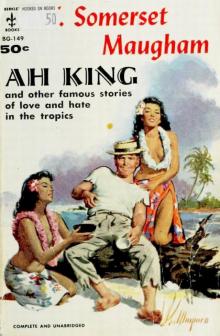 Ah King (Works of W. Somerset Maugham)
Ah King (Works of W. Somerset Maugham) Collected Short Stories: Volume 1
Collected Short Stories: Volume 1 Collected Short Stories Volume 2
Collected Short Stories Volume 2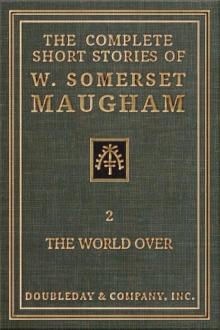 The Complete Short Stories of W. Somerset Maugham - II - The World Over
The Complete Short Stories of W. Somerset Maugham - II - The World Over Collected Short Stories Volume 4
Collected Short Stories Volume 4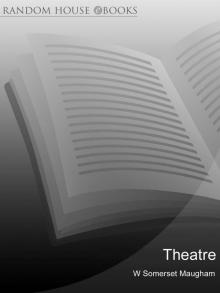 Theatre
Theatre Short Stories
Short Stories Then and Now
Then and Now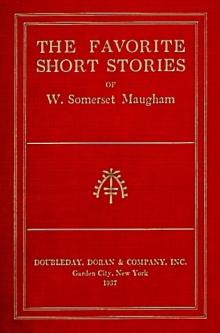 The Favorite Short Stories of W. Somerset Maugham
The Favorite Short Stories of W. Somerset Maugham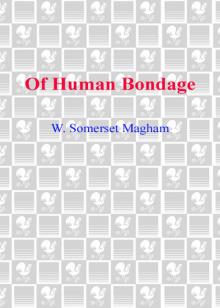 Of Human Bondage
Of Human Bondage The Magician
The Magician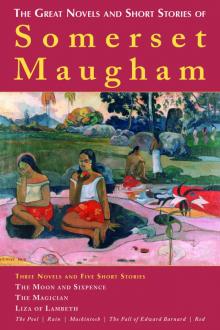 The Great Exotic Novels and Short Stories of Somerset Maugham
The Great Exotic Novels and Short Stories of Somerset Maugham A Writer's Notebook
A Writer's Notebook Christmas Holiday
Christmas Holiday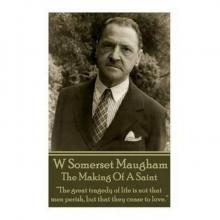 The Making of a Saint
The Making of a Saint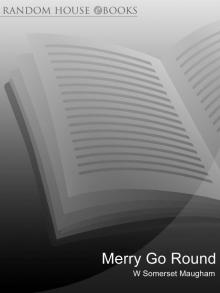 Merry Go Round
Merry Go Round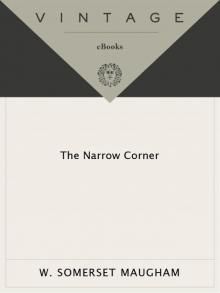 The Narrow Corner
The Narrow Corner Collected Short Stories Volume 3
Collected Short Stories Volume 3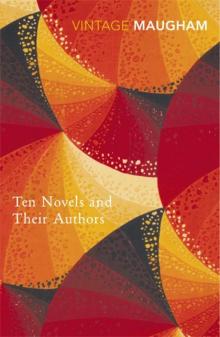 Ten Novels and Their Authors
Ten Novels and Their Authors Ashenden
Ashenden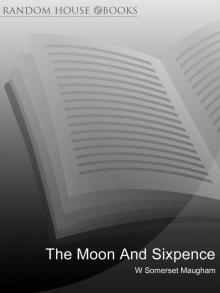 The Moon and Sixpence
The Moon and Sixpence Cakes and Ale
Cakes and Ale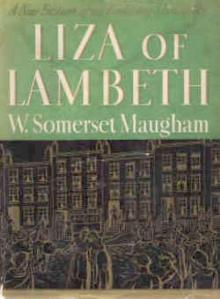 Liza of Lambeth
Liza of Lambeth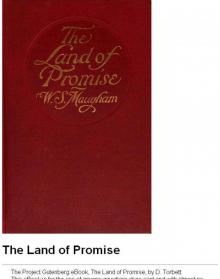 The Land of Promise: A Comedy in Four Acts (1922)
The Land of Promise: A Comedy in Four Acts (1922) A Writer's Notebook (Vintage International)
A Writer's Notebook (Vintage International)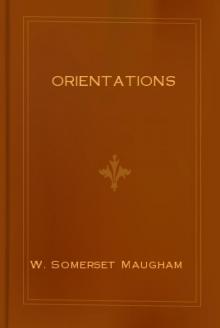 Orientations
Orientations Selected Masterpieces
Selected Masterpieces Mrs Craddock
Mrs Craddock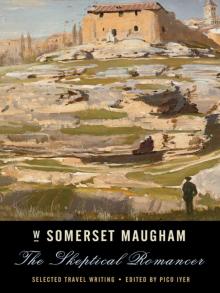 The Skeptical Romancer
The Skeptical Romancer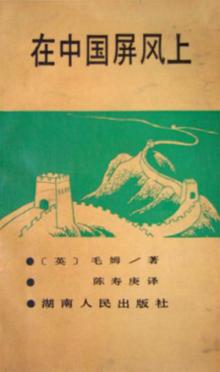 On a Chinese Screen
On a Chinese Screen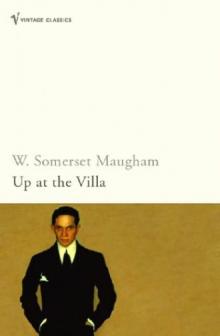 (1941) Up at the Villa
(1941) Up at the Villa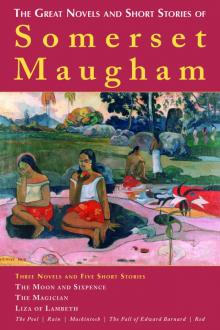 The Great Novels and Short Stories of Somerset Maugham
The Great Novels and Short Stories of Somerset Maugham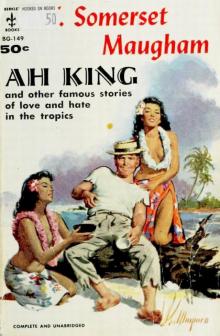 Ah King
Ah King The Explorer
The Explorer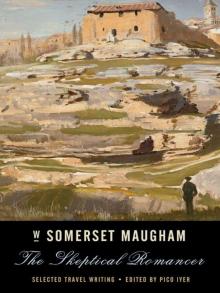 The Skeptical Romancer: Selected Travel Writing (Vintage Departures)
The Skeptical Romancer: Selected Travel Writing (Vintage Departures)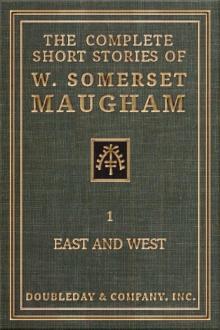 The Complete Short Stories of W. Somerset Maugham - I - East and West
The Complete Short Stories of W. Somerset Maugham - I - East and West